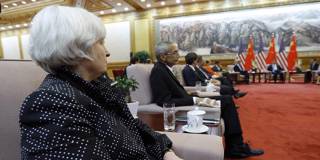Contrary to the prevailing narrative in the West, cooperation with China has been the norm, rather than the exception, for decades. But if G7 leaders decide to make "core values" the basis of international cooperation, this could well change.
LONDON – The world order is at risk of a lasting split, with the United States and its allies on one side, and China and its partners on the other. As US Treasury Secretary Janet Yellen noted at an Atlantic Council event last month, this outcome is far from desirable, and the US must work with China to prevent it. But, practically in her next breath, Yellen advocated actions that could thwart such an effort.
In Yellen’s view, the US should be deepening ties with countries that have “strong adherence to a set of norms and values about how to operate in the global economy and about how to run the global economic system.” In her view, picking partners that are “committed to a set of core values and principles” is the key to effective cooperation on important issues.
But where does that leave countries with different values and principles? How can the global institutional architecture survive if countries limit open engagement only to those who view the world the same way they do? If the West excludes a power like China from its multilateral arrangements, what can China do other than spearhead alternatives?

LONDON – The world order is at risk of a lasting split, with the United States and its allies on one side, and China and its partners on the other. As US Treasury Secretary Janet Yellen noted at an Atlantic Council event last month, this outcome is far from desirable, and the US must work with China to prevent it. But, practically in her next breath, Yellen advocated actions that could thwart such an effort.
In Yellen’s view, the US should be deepening ties with countries that have “strong adherence to a set of norms and values about how to operate in the global economy and about how to run the global economic system.” In her view, picking partners that are “committed to a set of core values and principles” is the key to effective cooperation on important issues.
But where does that leave countries with different values and principles? How can the global institutional architecture survive if countries limit open engagement only to those who view the world the same way they do? If the West excludes a power like China from its multilateral arrangements, what can China do other than spearhead alternatives?